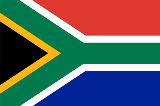CUSTOMS REGULATIONS
- Customs clearance cannot be finalized if the shipper/owner of the goods is not in the country. The owner of the goods must be present for Customs clearance.
- Shippers should arrive in South Africa approximately 7 – 10 days prior to the arrival of their consignment(s) at the main port of entry, to complete customs documents, and have it attested by the local SARS office (South African Revenue Service).
- The attestation of the documents by SARS is confirmation of legal status for duty free clearance – without the attested documents full duties & taxes will be due, and customs may request an import permit, which will delay the clearance process.
- The relevant embassy or consulate will apply for a diplomatic clearance certificate to DIRCO (South African Department of International Relations & Co-operation) after the officer’s arrival in South Africa.
- The instance of customs exam is high.
- New items are dutiable and must be declared separately.
- Diplomats may import items duty free.
DOCUMENTS REQUIRED
- Certificate from Embassy signed by South African Department of Foreign Affairs
- Detailed inventory in English
- Diplomatic clearance
- Diplomats may import items duty free.
MOTOR VEHICLES
- Vehicle with wheels is subject to strict guidelines regardless of whether it has an engine or will be used on public roads or not. This includes cars, motor cycles, caravans, and trailers.
- No left-hand drive motor vehicles can be imported if registered on or after January 1, 2000
- The owner of the goods must be in possession of the import permit and letter of authority prior to the arrival of any motor vehicles, motorbikes, motor scooters, or motorcycles (anything motorized); delays related to the permit may result in demurrage charges (also applies to diplomats).
- All motor vehicles are stopped for a customs exam.
- Foreign diplomats pay no duties or taxes, subject to provisions of the diplomatic clearance certificate, and proof of value.
- Controls are in place, do not ship a vehicle until all documents have been obtained:
- (1) Import Permit from ITAC (www.ITAC.org.za)
- (2) Original purchase invoice OR 2 valuations from registered dealers at origin (the valuation will be used to calculate the customs deposit or “provisional payment” due.)
PETS
- An import permit may be granted after the owner of the goods has made arrangements for the period of quarantine required for pets travelling from most, but not all countries; check with agent.
- Call agent for restrictions on the import of live animals.
- State Veterinary Health Certificate, with Rabies vaccination done 30 days or less before arrival in South Africa.
ANTIQUES, ARTIFACTS, CARPETS, PAINTINGS
-
Inheritances:
Documents Required
- Copy of death certificate
- Copy of will of deceased or certified relevant extract, or copy of Probate from the court if the deceased died intestate; English translation required.
- Inventory with lawyer’s declaration that the imported goods are the legatee’s rightful share of the estate
- South Africa Bureau of Standards Letter of Authority in Pretoria (not applicable for second-hand household effects unless motorized vehicles)
- Import permit (not applicable for second-hand household effects unless motorized vehicles)
- Declaration from the Legatee confirming permanent residency in South Africa and the right to share of the estate
Specific Information
- An inventory is required only if the copy of the deceased’s will or other document does not specifically detail the goods to be imported.
- Items of inheritance may be imported duty free if the legatee is permanently residing in South Africa.
- Duty is payable on inherited motor cars, motorcycles, and mopeds.
- Goods should not be shipped until Customs has authorized duty-free entry.
DUTIABLE/RESTRICTED ITEMS
- Local currency of over $10,000; gold coins, coin and stamp collections and unprocessed gold must be declared.
- Endangered species of plants or wildlife, alive or dead, including parts and articles made from them (require CITES permit)
- Animal and animal byproducts
- Medicines for personal use (note from physician and prescription required)
- Cigarettes (200), cigars (20), tobacco (250g)
- Perfume (50 ml)
- Eau de toilette (250ml)
- Goods for personal use
- Wine / liquor / alcohol
- Import permit and liquor removal certificate required.
- If less than 15 L a liquor removal certificate is not required however, duties and taxes will be applicable.
- A wine list is required and must be loaded last in the shipment.
- Customs exam will be applicable.
- Items subject to payment of duties.
- Documentation requirements must be met prior to the arrival of the shipment.
- Dangerous goods / firearms
- Import permit and South African Police Firearm Registrar Certificate SAP 312 are required.
- Firearms must be hand carried by the owner of the goods.
- Shipment cannot be cleared if the firearms are included in the sea / air shipments
- Items are subject to the payment of duties.
PROHIBITED ITEMS
- Drugs and narcotics
- Pornographic or objectionable materials
- Honey, beeswax, bees and their larvae or eggs, used beehive appliances
- Uncut diamonds
- Unwrought gold
- Ammunition & explosives
- Fireworks
- Perishable foodstuffs
- Organic materials such as (but not limited to) plants, seeds, bulbs, raw cotton, skins, etc., or items containing these
- Walkie-talkies and radios (may include other prohibited communication devices)
- Animal products (certain feathers, furs, skins, tusks, or animals identified under protected specifies regulations)